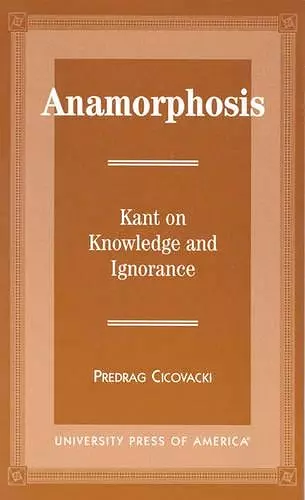Anamorphosis
Kant and Knowledge and Ignorance
Format:Paperback
Publisher:University Press of America
Published:3rd Oct '97
Currently unavailable, our supplier has not provided us a restock date

This book intends to show that we should re-think and re-evaluate our dogmatic commitment to a cognitivistic attitude. Our high regard for knowledge is due to the fact that we expect that it will help us satisfy not only our practical needs but also guide us toward a meaningful and fulfilled life. A careful examination of the nature and limits of knowledge reveals that both expectations cannot be satisfied. Following Kant, Cicovacki comes to the conclusion that, although our knowledge of reality seems to be reliable and true, at the same time it seems to be one-sided and very narrowly oriented. Our practical purposes seem to be served quite well, but it is dubious whether our knowledge helps us understand and find our own place and role in reality. Those pursuing science and analytic philosophy do not seem to realize that our knowledge of reality is at the same time reliable and true, and yet distorting and damaging. Cicovacki focuses on Kant's question: ^D< 'What is man?' as the ultimate question of philosophy. He invites a new interpretation of Kant since the question indicates that, for Kant, a broadly construed philosophical anthropology, rather than metaphysics, or epistemology, or ethics, is the most fundamental philosophical discipline. 'The real philosopher,' Kant tells us, is 'the teacher of wisdom through doctrine and example.' Contents: Prelude; PART I: A Knowledge of Knowledge; The Epistemological Project; Cognition, Recognition, and Cognitive Interest; Concepts as Rules; Concepts as Norms; PART II: A Knowledge of Ignorance; Striving for Truth: The Problem of Criterion; Dreams and Reality: On the Existential Presupposition of Cognitive Experience; The Real and the Preceived; Healing the Wound; Bibliography; Index.
ISBN: 9780761807902
Dimensions: 210mm x 134mm x 17mm
Weight: 367g
336 pages